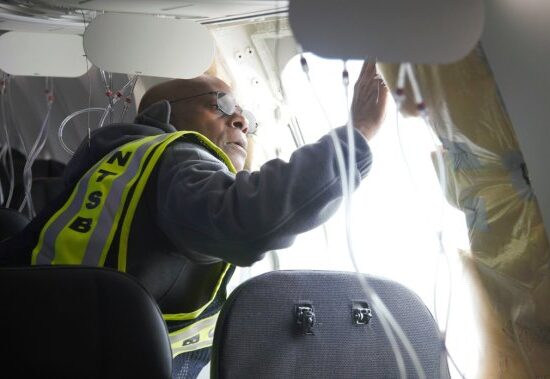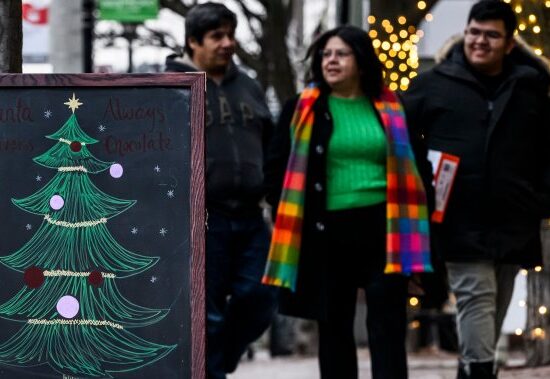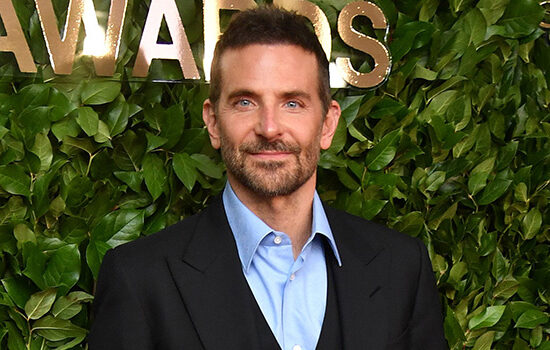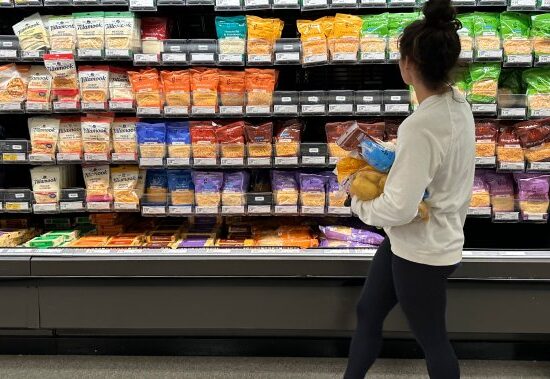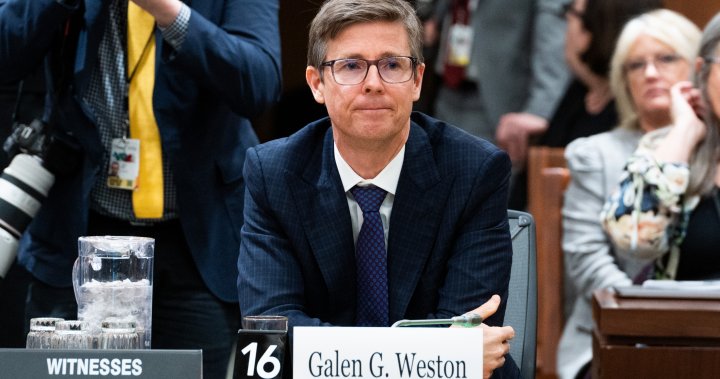
The federal government’s efforts to gather Canadian grocery executives for a summit to tackle food inflation is “disingenuous” and unlikely to bear much fruit, analysts say.
Prime Minister Justin Trudeau on Thursday announced he was summoning leaders from Canada’s biggest grocers together on Monday, calling for a plan to stabilize food inflation and warning tax measures were on the table should Canadians continue to face undue pain at the grocery store.
“It does not make sense in a country like Canada that our largest grocery chains should be making record profits while Canadians are struggling to put food on the table and we’re seeing record usage of food banks,” Trudeau said.
Loblaw president Galen G. Weston, Metro CEO Eric La Fleche and Walmart Canada CEO Gonzalo Gebara will all attend the meeting on Monday, spokespersons for the executives’ individual companies confirmed to Global News.
Representatives for Sobeys parent company Empire Co. Ltd. and Costco did not respond to requests for comment before publishing deadlines.
The calls come as Canadians continue to face price hikes at the grocery store even as overall inflation cools.
The latest consumer price index from Statistics Canada showed inflation was up 3.3 per cent year-over-year in July, while food prices at the grocery store were up 8.5 per cent in the month. While still elevated, that’s slowed from annual price hikes of 9.1 per cent in June and of more than 11 per cent last fall.
Sylvain Charlebois, the director of the Agri-Food Analytics Lab at Dalhousie University, will also attend the meetings in Ottawa on Monday as an unpaid observer. He said it’s not a surprise to see Industry Minister Francois-Philippe Champagne step up to take on food inflation, as the cost of living has become the “number one concern” for Canadians right now.
The Liberals have made a concerted effort to tackle affordability concerns for months, including announcing a so-called “grocery rebate” in the 2023 federal budget this spring.
But since that time, the Conservative Party has widened its lead over the Liberals in the polls.

Abacus polling released Thursday showed the Conservatives have a 15-point lead over the Liberals, with affordability issues topping voters’ agendas.
Back in July, when the Conservatives first edged out the Liberals in Ipsos polling, CEO Darrell Bricker told Global News that it wasn’t a matter of the opposition gaining traction, but rather a growing “fatigue” with the Trudeau government.
“People are really not that happy with the direction of the country at the moment and they lay a lot of the blame for that right now on the Trudeau administration,” Bricker said at the time.
Michael von Massow, a food economist with the University of Guelph, told Global News that his “cynical” view of the grocer summit is that it’s a “vague” and “disingenuous” proposal to give the appearance of action on food prices.
“We’re seeing this government get hammered about affordability,” he said.
“It appears to be something to take heat off of them, rather than something that will really fundamentally affect affordability for Canadians.”
What can the grocer summit accomplish?
Grocery executives may be an “easy target” for Ottawa, von Massow said, but that doesn’t mean the grocers themselves can solve food inflation with a snap of their fingers.
Grocers may be on the front-lines of where Canadians feel price pressures, but he noted that ignores the roles played by other players in the supply chain and global factors such as the war in Ukraine.
“This will not address the war in Ukraine, this will not address extreme weather events. It frankly doesn’t even address food prices further up the value chain,” von Massow said.
The Retail Council of Canada also argued in a statement to Global News that rising vendor costs are what’s driving increased prices at the grocery store.
“Grocers are always prepared to have good faith discussions with government about our industry, challenges with the food supply chain, or with affordability for Canadians,” spokesperson Michelle Wasylyshen said.
“But we are not going to get anywhere with discussions that time and time again fail to look below the surface as to the true cause of rising grocery prices.”
The Competition Bureau’s probe of concentration in Canada’s grocery sector said that food inflation could be limited in the long run by promoting more competition in the market, but did not lay the blame for the current bout of inflation on profiteering by grocers.
Loblaw’s Weston also defended the company’s “reasonable profitability” in testimony before members of Parliament earlier this spring.

NDP Leader Jagmeet Singh has pitched imposing a windfall tax on large corporations to discourage companies that could be taking advantage of elevated inflation to price gouge consumers.
Both von Massow and Charlebois told Global News that if a windfall tax or other punitive measures were implemented, as Trudeau hinted, it likely wouldn’t have the effect of bringing down prices at the grocery store.
Charlebois said any additional tax burdens put on the grocers would instead likely be passed on to the consumers themselves, in effect backfiring on the federal government.
Trudeau’s tax threat could succeed as the “stick” to get the grocers in the room to talk about what’s possible to improve affordability in the sector, he added.
From a public relations perspective, Charlebois believes it would be wise for the grocers to show up in Ottawa.
“It would be ill-advised for CEOs to miss the meeting.”
Food inflation set to ‘greatly fall’ anyways
Regardless of what concrete measures come out of the meeting with the grocers, von Massow and Charlebois said it’s likely food inflation will continue to ease through the rest of the year.
While ongoing extreme weather events have been a persistent fuel for food inflation in recent months, last year’s inflation figures were especially impacted by Russia’s invasion of Ukraine, and Charlebois said there “hasn’t been a major surprise this year” to repeat the eye-popping price pressures of 2022.
Forecasts from the Agri-Food Analytics Lab expect inflation will slow to between five and seven per cent before the end of 2023.
Charlebois said that by April or May of next year, the gap between overall inflation and food inflation should fully close, giving Canadians a bit more sense of peace on their shopping bills.
“That’s a big one because when people see that difference, that’s when they’re really spooked at the grocery store. They see a big difference between what’s going on at the grocery store versus what’s happening with the economy,” he said.

Some grocers are also expecting price pressures to ease in the months ahead.
Empire CEO Michael Medline said during a call with analysts on Thursday discussing the company’s first quarter earnings that he expects food inflation is going to “greatly fall” in the months to come. He noted, however, that inflation’s path is “choppy” and consumers remain “skittish” as it relates to price sensitivity.
Putting out a public call for grocers to act on food inflation is, in this situation, a no-lose situation for the Liberals, von Massow argued.
Either food inflation declines as predicted and the Liberals are able to take credit because they “put pressure on the grocers,” von Massow said, or if price pressures remain elevated, they can impose a tax and say that they’re looking out for the consumer.
“To a large degree, I think it is the government trying to say we are doing something without providing a lot of detail to make a compelling argument that they are actually doing something,” he said.
— with files from Global News’ Sean Boynton, Kyle Benning, Saba Aziz











